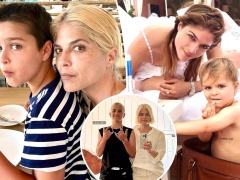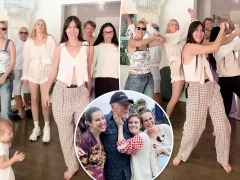
Naomi Campell revealed her drug addiction nearly killed her at the height of her career in the ’90s.
The legendary runway star got candid about her past substance abuse in AppleTV+’s new docuseries “The Super Models,” admitting she turned to cocaine to cope with childhood trauma and the death of Italian designer and close friend Gianni Versace.
“I guess when I started using, that was one of the things I tried to cover up, was grief. Addiction is such a … bulls—t thing, it really is,” Campbell said.
“You think, ‘Oh it’s gonna heal that wound.’ It doesn’t. It can cause such huge fear and anxiety. So I got really angry.”
The fashion icon said her world was shaken when Versace was murdered outside of his Miami Beach home in 1997.
“He was very sensitive to feeling me, like, he pushed me,” Campbell recalled. “He would push me to step outside and go further when I didn’t think I had it within myself to do it. So when he died, my grief became very bad.”


The British-born supermodel battled her addiction for five years, even collapsing during a photoshoot in 1999.
“When you try to cover something up, your feelings — you spoke about abandonment. I tried to cover that with something,” she confessed in the docuseries. “You can’t cover it. I was killing myself. It was very hurtful.”
But that terrifying incident was the wake-up call she needed to check into rehab.


“I chose to go to rehab. It was one of the best and only things I could have done for myself at that time,” Campbell, 53, said.
“It’s taken me many years to work on and deal with,” she added. “And it does still come up sometimes. But I just now have the tools how to deal with it now when it comes up.”
In addition to struggling with Versace’s death, the mother of two has also previously reflected on the childhood trauma she experienced after her father abandoned her mother.

Campbell opened up about her abandonment issues during a 2000 interview with Barbara Walters — which was featured in “The Super Models.”
“There’s a lot of issues that I have from childhood,” she said. “Well, for instance, not knowing your father, not seeing your mother. That brings up a lot of — it manifests a lot of feelings.”
“One of those feelings, absolutely is anger,” she continued, adding, “It’s a manifestation of a deeper issue, I think, anger. And that for me, I think is based on insecurity, self-esteem and loneliness…”






